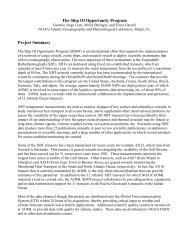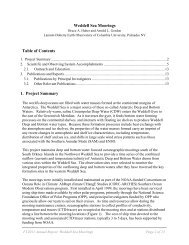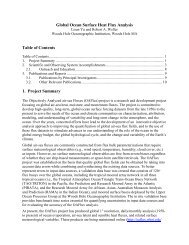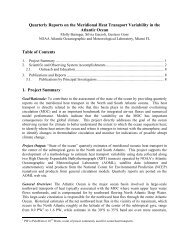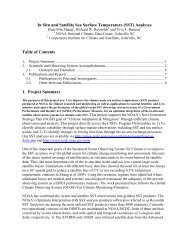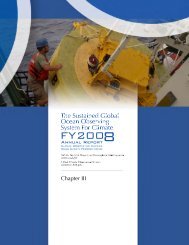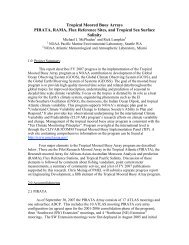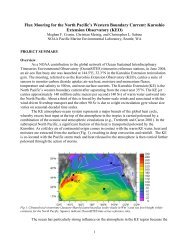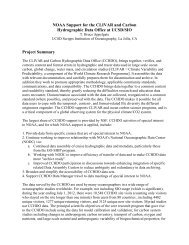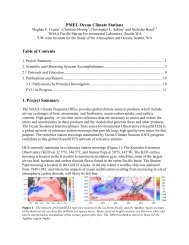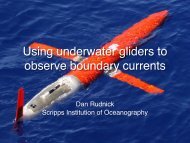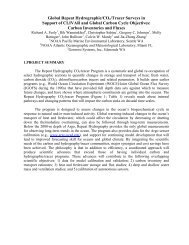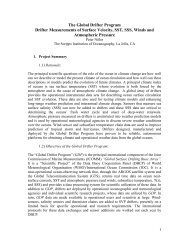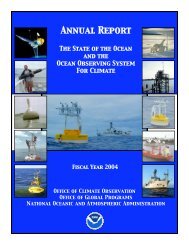GCOS Implementation Plan - WMO
GCOS Implementation Plan - WMO
GCOS Implementation Plan - WMO
Create successful ePaper yourself
Turn your PDF publications into a flip-book with our unique Google optimized e-Paper software.
<strong>Implementation</strong> <strong>Plan</strong> for the Global Observing System for Climate in Support of the UNFCCC<br />
(2010 Update)<br />
ocean initial conditions for decadal forecasts and emphasis is now on improving the systems and<br />
moving them forward into coupled assimilation efforts. Sustaining ocean reanalysis/assimilation needs<br />
to be a priority of the <strong>GCOS</strong> IP to make maximum use of the ocean data. Key needs in this area are<br />
noted below in section 5.4.<br />
Agents for <strong>Implementation</strong><br />
There are many different ways of developing capacity and functionality for the oceanic climate<br />
observing system. Unlike the atmospheric domain, there is not, at present, a system of national ocean<br />
centres or services dedicated to the implementation and maintenance of the observing system.<br />
<strong>Implementation</strong> ultimately falls to multiple agencies within nations, and these activities can be subject<br />
to formal, informal or minimal international coordination. Bodies such as the <strong>WMO</strong>/IOC JCOMM and<br />
the IOC Intergovernmental Committee for the Global Ocean Observing System (I-GOOS) have a<br />
broad remit but they do not yet cover all aspects relevant to the UNFCCC. In some cases, it is<br />
reasonable and appropriate to seek actions through such high-level bodies; in others, often involving<br />
research or pilot projects, it is more appropriate to activate regional and/or problem-specific pilot<br />
projects to undertake actions. In all cases where a body or group are named in Actions, it is<br />
understood that such groups mostly provide coordination and that the ultimate responsibility lies with<br />
nations and their agencies.<br />
Most in situ observing activities in the oceans continue to be carried out under research agency<br />
support and on research programme time limits. A particular concern is the fragility of the financial<br />
arrangements that support most of the present effort; there has been very limited progress in the<br />
establishment of national ocean or climate institutions tasked with sustaining a climate-quality ocean<br />
observing system. Thus, the primary Agents for <strong>Implementation</strong> for ocean observations and analyses<br />
remain the national and regional research organizations, with their project-time-scale focus and<br />
emphasis on principal investigator-driven activities.<br />
<strong>Implementation</strong> of the observing system depends on national actions by research and operational<br />
agents for implementation. The regular reporting by Parties on systematic observation to the<br />
UNFCCC, which includes national institutional arrangements and ocean observation activities, should<br />
be encouraged (see Action C4) and utilised to assess progress in national action.<br />
The multi-purpose nature of the global ocean observing systems means that there is an ongoing need<br />
to ensure balance and relevance. The GOOS/<strong>GCOS</strong>/WCRP Ocean Observation Panel for Climate<br />
(OOPC) and other relevant bodies of the IOC and JCOMM will provide oversight, and in collaboration<br />
with research programmes, provide monitoring and assessment of the evolving system and its<br />
products. The system must be responsive to the needs of the UNFCCC but at the same time exploit<br />
synergy and efficiencies with other users of the observing system.<br />
Action O1 [IP-04 O1] 76<br />
Action: Analyse the ocean section of national reports on systematic observation for climate to the<br />
UNFCCC, and encourage non-Annex-I Parties to contribute reports.<br />
Who: IOC and I-GOOS JCOMM, in consultation with GOOS.<br />
Time-Frame: Conforming to UNFCCC guidelines.<br />
Performance Indicators: Number of Parties providing reports on their ocean observing activities.<br />
Annual Cost Implications: 77



